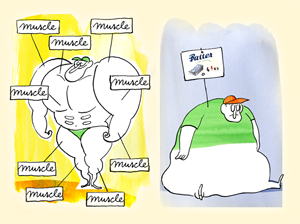Too much exercise or too little?
 Everyone has an opinion on exercise, and it seems to vary based on whether you're an exerciser or a non-exerciser. Non-exercisers sometimes see physically fit individuals as obsessive-compulsive "health nuts." Exercisers, on the other hand, can get a bit self-righteous, bragging about body fat percentages and cholesterol levels.
Everyone has an opinion on exercise, and it seems to vary based on whether you're an exerciser or a non-exerciser. Non-exercisers sometimes see physically fit individuals as obsessive-compulsive "health nuts." Exercisers, on the other hand, can get a bit self-righteous, bragging about body fat percentages and cholesterol levels.
Each end of the spectrum presents its own set of problems. The most recent research indicates the presence of a dose-response curve upon which there is an ideal amount of physical activity. To put it simply, too little exercise is bad, but so is too much. Too little exercise results in increased risks for serious health problems such as cardiovascular disease, diabetes, and some cancers. Too much exercise can result in overuse injuries, oxidative stress, and decreased immune function. Oddly, both can result in disturbed sleep patterns, depression, anxiety, and reports of increased fatigue levels.
So, which is worse? Despite the media attention given to exercise-related tragedies—"Marathoner Collapses at Finish Line"—there is little evidence linking too much exercise to negative outcomes such as sudden cardiac death and cardiac arrhythmia. It just doesn't happen all that often.
But approximately two-thirds of Americans are overweight, and rates of cardiovascular disease and diabetes are very high, with the majority of the risk stemming from lifestyle. By some estimates, poor lifestyle choices account for up to 95 percent of the incidence of cardiovascular disease, with only 5 percent related to genetic predisposition.
My vote comes from this epidemiological perspective. Too little exercise is worse than too much.
—Emily Heithaus, director of lifetime fitness. Heithaus, who earned a Ph.D. in health education from the Ohio State University, is an avid triathlete who has definitely suffered on occasion from too much exercise.

 Delicious
Delicious Facebook
Facebook StumbleUpon
StumbleUpon Digg
Digg reddit
reddit